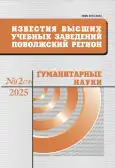Tasks of zemsky self-government bodies (March – October 1917) and ways to solve them
- Authors: Sobornov P.E.1
-
Affiliations:
- Nizhny Novgorod Academy of the Ministry of Internal Affairs of Russia
- Issue: No 2 (2025)
- Pages: 33-41
- Section: NATIONAL HISTORY
- URL: https://journal-vniispk.ru/2072-3024/article/view/306796
- DOI: https://doi.org/10.21685/2072-3024-2025-2-3
- ID: 306796
Cite item
Full Text
Abstract
Background. In the context of the need to involve citizens in solving the prob lems of local self-government, there is a need to study the experience of solving problems by zemstvo councils, how local governments at the stage of the Russian revolution of 1917. An assessment is given of the manifestations and consequences of the unprecedented reor ganization of zemstvo councils in the form of an exacerbation of inter-party disagreements and the impossibility of implementing a huge number of tasks that were assigned by the state to zemstvo self-government bodies. The purpose of the work is to study the manifesta tions and results of the process of reforming zemstvo self-government in revolutionary Russia. Materials and methods. The implementation of research tasks was achieved on the basis of the use of articles of the journal “Zemskoe Delo” which was published under the editorship of prominent theorists and practitioners of local self-government of pre revolutionary Russia – Boris Borisovich Veselovsky (1880–1954) and Dmitry Dmitrievich Protopopov (1865–1934) in St. Petersburg (Petrograd) in 1909–1918. Methodological po tential includes: a relatively historical method, the use of which allows you to compare the methods of resolving various tasks by zemstvo administrations. Conclusions. An assess ment is given of the manifestations and consequences of the unprecedented reorganization of zemstvo administrations in the form of aggravation of inter-party disagreements and the impossibility of implementing a huge number of tasks that were assigned by the state to the zemstvo self-government bodies at one of the turning points in the history of Russian state hood. The study of the process of reforming zemstvo self-government in revolutionary Rus sia makes it possible to understand the facts of the impossibility of turning zemstvo admin istrations into full-fledged local government bodies, which was originally planned. The au thor concluded that the projects of the Provisional Government itself to turn zemstvos into schools of local self-government in the Russian province did not find their implementation, both because of the weak interest in the problems of self-government in Russian society, expressed in the growing apathy, and because of acute social class disagreements that arose when discussing any problems of local life.
About the authors
Pavel E. Sobornov
Nizhny Novgorod Academy of the Ministry of Internal Affairs of Russia
Author for correspondence.
Email: sobornovpavel@inbox.ru
Candidate of historical sciences, associate professor, associate professor of the sub-department of theory and history of state and law
(3 Ankudinovskoye highway, Nizhny Novgorod, Russia)References
- Baranov E.P. Preparation of the reform of local government and self-government in 1917. Vestnik Moskovskogo universiteta. Seriya XI: Pravo = Bulletin of Moscow Uni-versity. Series 11: Law. 1975;(3):63–67. (In Russ.)
- Kel'son Z. Militia of the Provisional Government. Memories. Chapter 3. Byloe: zhurnal, posvyashchennyy istorii osvoboditel'nogo dvizheniya = Past: a magazine dedicated to the history of the liberation movement. 1925;(2):160–197. (In Russ.)
- Veselovskiy B. Zemstvo in 1917. Zemskoe delo: zhurnal dlya razrabotki zemskikh voprosov i vsestoronnego osveshcheniya deyatel'nosti i nuzhd zemskogo samouprav-leniya v Rossii = Zemskoe delo: a journal for the development of zemstvo issues and comprehensive coverage of the activities and needs of zemstvo self-government in Russia. 1918;(1):1–9. (In Russ.)
- Veselovskiy B.B. Self-government on the threshold of a new life. Zemskoe delo: zhur-nal dlya razrabotki zemskikh voprosov i vsestoronnego osveshcheniya deyatel'nosti i nuzhd zemskogo samoupravleniya v Rossii = Zemskoe delo: a journal for the develop-ment of zemstvo issues and comprehensive coverage of the activities and needs of zem-stvo self-government in Russia. 1917;(5-6):203–205. (In Russ.)
- Medynskiy E. Lectures in the village on current events and immediate tasks. Zemskoe delo: zhurnal dlya razrabotki zemskikh voprosov i vsestoronnego osveshcheniya deyatel'nosti i nuzhd zemskogo samoupravleniya v Rossii = Zemskoe delo: a journal for the development of zemstvo issues and comprehensive coverage of the activities and needs of zemstvo self-government in Russia. 1917;(7):267–269. (In Russ.)
- Zvyagintsev E. Updated Zemstvo on primary school education. Zemskoe delo: zhurnal dlya razrabotki zemskikh voprosov i vsestoronnego osveshcheniya deyatel'nosti i nuzhd zemskogo samoupravleniya v Rossii = Zemskoe delo: a journal for the development of zemstvo issues and comprehensive coverage of the activities and needs of zemstvo self-government in Russia. 1917;(8):316–321. (In Russ.)
- Veselovskiy B.B. On the eve of the renewal of the zemstvo. Zemskoe delo: zhurnal dlya razrabotki zemskikh voprosov i vsestoronnego osveshcheniya deyatel'nosti i nuzhd zem-skogo samoupravleniya v Rossii = Zemskoe delo: a journal for the development of zem-stvo issues and comprehensive coverage of the activities and needs of zemstvo self-government in Russia. 1917;(9-10):363–365. (In Russ.)
- On the allocation of cities from the zemstvos: From the explanatory note of the Ministry of Internal Affairs of the Provisional Government to the project on the allocation of cit-ies. Zemskoe delo: zhurnal dlya razrabotki zemskikh voprosov i vsestoronnego osvesh-cheniya deyatel'nosti i nuzhd zemskogo samoupravleniya v Rossii = Zemskoe delo: a journal for the development of zemstvo issues and comprehensive coverage of the activi-ties and needs of zemstvo self-government in Russia. 1917;(17-18):407–413. (In Russ.)
- P. V. Zemstvo and militsiya. Zemskoe delo: zhurnal dlya razrabotki zemskikh voprosov i vsestoronnego osveshcheniya deyatel'nosti i nuzhd zemskogo samoupravleniya v Ros-sii = Zemskoe delo: a journal for the development of zemstvo issues and comprehensive coverage of the activities and needs of zemstvo self-government in Russia. 1917; (23-24):467–470. (In Russ.)
Supplementary files






















